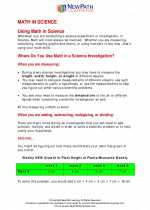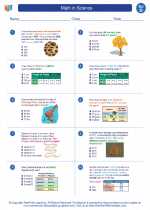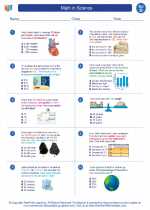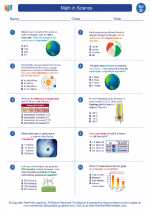Math in Science -> experiments
Experiments
An experiment is a scientific procedure undertaken to make a discovery, test a hypothesis, or demonstrate a known fact. It is a crucial part of the scientific method and allows scientists to systematically investigate the natural world.
Types of Experiments
There are several types of experiments, including:
- Laboratory Experiments: Conducted in a controlled environment, such as a laboratory, where variables can be carefully manipulated and measured.
- Field Experiments: Carried out in a natural setting, allowing researchers to study phenomena in real-life conditions.
- Controlled Experiments: Involve the manipulation of one or more variables while keeping all other factors constant to isolate the effects of the manipulated variables.
- Quasi-Experiments: Similar to true experiments but lack random assignment of participants or control over the independent variable.
Components of an Experiment
Key components of an experiment include:
- Hypothesis: A testable prediction about the outcome of the experiment.
- Variables: The factors that can change or be manipulated in the experiment, including independent, dependent, and control variables.
- Experimental Procedure: The step-by-step process followed to conduct the experiment.
- Data Collection: The systematic gathering of information or measurements during the experiment.
- Analysis and Conclusion: The interpretation of the data collected and the determination of whether the hypothesis was supported or refuted.
Importance of Experiments
Experiments are essential for several reasons:
- They allow scientists to test and refine theories and hypotheses.
- They provide empirical evidence to support or refute scientific claims.
- They contribute to the advancement of knowledge and understanding in various fields of science.
- They help in making informed decisions and solving real-world problems.
Study Guide
To effectively understand and conduct experiments, students should:
- Learn the steps of the scientific method and understand how experiments fit into this process.
- Understand the different types of experiments and their applications in scientific research.
- Know how to formulate a hypothesis and identify variables in an experiment.
- Practice designing and conducting simple experiments to test specific questions or hypotheses.
- Develop skills in collecting, analyzing, and presenting data obtained from experiments.
By mastering these concepts and skills, students can become proficient in conducting and interpreting experiments, contributing to their scientific knowledge and critical thinking abilities.
[Experiments] Related Worksheets and Study Guides:
.◂Science Worksheets and Study Guides Fourth Grade. Math in Science
Study Guide Math in Science - 4th grade
Math in Science - 4th grade  Worksheet/Answer key
Worksheet/Answer key Math in Science - 4th grade
Math in Science - 4th grade  Worksheet/Answer key
Worksheet/Answer key Math in Science - 4th grade
Math in Science - 4th grade  Worksheet/Answer key
Worksheet/Answer key Math in Science - 4th grade
Math in Science - 4th grade 

 Worksheet/Answer key
Worksheet/Answer key
 Worksheet/Answer key
Worksheet/Answer key
 Worksheet/Answer key
Worksheet/Answer key

The resources above cover the following skills:
Science as Inquiry and Process (SA1, SA2, SA3)
The student develops an understanding of the processes of science by asking questions, predicting, observing, describing, measuring, classifying, making generalizations, inferring and communicating.